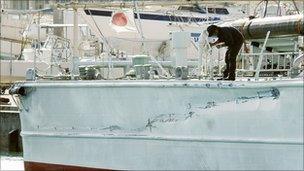Japan warns China against 'extreme nationalism'
- Published

Japan has warned China that both nations must avoid stirring up "extreme nationalism" in their ongoing row over the detention of a Chinese sea captain.
The Japanese government said it wanted to use all possible channels to avoid any further escalation.
China responded by saying it would not meet Japanese leaders on the sidelines of a UN summit in New York this week.
Beijing has demanded the release of the skipper, whose boat hit two Japanese patrol vessels in disputed waters.
The BBC's Roland Buerk in Tokyo says Japan's government is trying to persuade China to take the heat out of the damaging row.
The Chief Cabinet Secretary, Yoshito Sengoku, said officials "should be careful not to arouse narrow-minded extreme nationalism", not just in China, but in Japan and other countries too.
Just hours later, the Chinese foreign ministry said a meeting between Premier Wen Jiabao and his Japanese counterpart Naoto Kan would be inappropriate.
The dispute began two weeks ago when a Chinese fishing boat collided with two Japanese patrol ships near uninhabited islands in the East China Sea which both countries claim, as does Taiwan.
The islands, which lie north of Taiwan and south of Japan's Okinawa prefecture, have rich fishing grounds and may have oil and gas deposits.
The boat's captain was arrested on suspicion of deliberately ramming the vessels.
When a Japanese court extended his detention on Sunday for a further 10 days, China severed senior level government contacts.
Meanwhile, 1,000 young Japanese due to travel to the Shanghai Expo this week were told by Beijing they were no longer welcome.
Striking a conciliatory tone, Mr Sengoku said regional growth depended on the relationship between Asia's two biggest economies.
But he said the case was a legal matter, and the government would have to win China's understanding of Japan's judicial and political system.
- Published8 September 2010
- Published17 September 2010
- Published10 November 2014